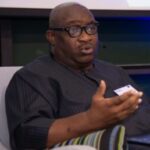The Executive Director of Media Rights Agenda, Mr. Edetaen Ojo, has emphasised the crucial role the media play in promoting whistleblowing and protecting the rights of whistleblowers at a sensitisation workshop organised by The African Centre for Media and Information Literacy (AFRICMIL) in Lagos.
During the workshop, titled “Anti-Corruption: The Importance of Women and People with Disabilities in Promoting Whistleblowing and Whistleblower Protection in Nigeria,” Mr. Ojo stressed that the media’s responsibility extends beyond mere reporting. He highlighted the need for the media to create an environment where whistleblowing is both encouraged and safeguarded.
He underscored the fundamental nature of whistleblowing as a mechanism for uncovering and addressing unethical or illegal activities within government and organizations saying “Whistleblowing is an essential mechanism for uncovering and addressing unethical or illegal activities and other wrongdoing in government and within organizations, including corruption, discrimination, fraud, abuse of power, among others.” He acknowledged the severe risks whistleblowers often face, including retaliation, job loss, and physical harm adding that these hazards are particularly high for women and persons with disabilities (PWDs).
Mr. Ojo highlighted the shared goal of the media and whistleblowers in promoting accountability and transparency, stating that the media relies heavily on information from both confidential and public sources, with some of the most impactful stories coming from whistleblowers. He stressed the importance of protecting confidential sources of information as a critical component of professional practice and ethics in the media, essential for the media to fulfill its role in society effectively.
He said the media has a constitutional duty to uphold public accountability and cited Section 22 of the Nigerian Constitution which says: “The press, radio, television, and other mass media agencies shall always be free to uphold the fundamental objectives in this Chapter and ensure the government’s responsibility and accountability to the people.” He stated that this provision requires the media to ensure that the government fulfills its duties and remains accountable to the public.
Mr. Ojo emphasized the need to protect whistleblowers and drew attention to the unique challenges faced by women and people with disabilities (PWDs). He urged the media to raise awareness about the importance of whistleblowing and the protections available to these vulnerable groups, stressing the media’s role in supporting and amplifying whistleblowing efforts among women and PWDs and advocating for tailored protections to meet their specific needs.
His presentation served as a clear call to the media to embrace its role as a watchdog and protector of public interest. He added that for the media to effectively fulfill its constitutional responsibilities, it must collaborate with whistleblowers and ensure their protection saying this is crucial for holding those in power accountable and safeguarding the principles of democracy, justice, and equity.







